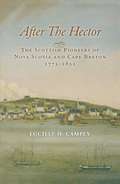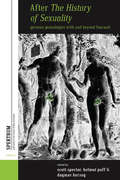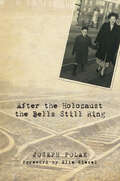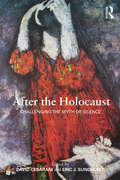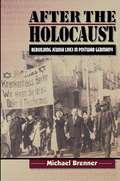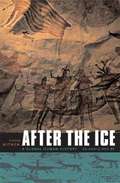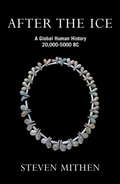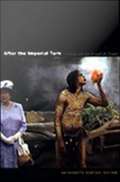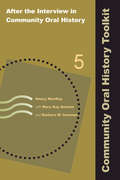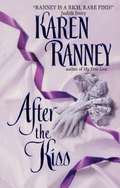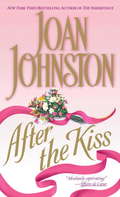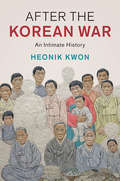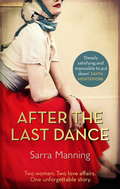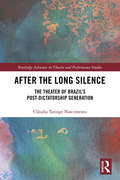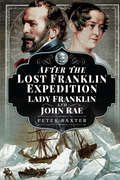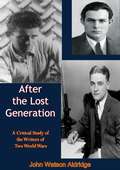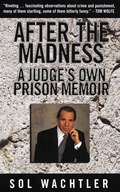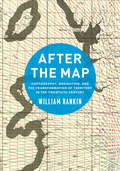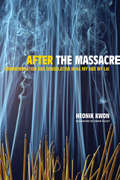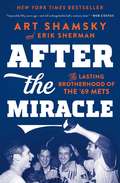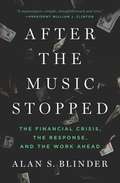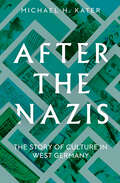- Table View
- List View
After the Hector: The Scottish Pioneers of Nova Scotia and Cape Breton, 1773-1852
by Lucille H. CampeyThis is the first fully documented and detailed account, produced in recent times, of one of the greatest early migrations of Scots to North America. The arrival of the Hector in 1773, with nearly 200 Scottish passengers, sparked a huge influx of Scots to Nova Scotia and Cape Breton. Thousands of Scots, mainly from the Highlands and Islands, streamed into the province during the late 1700s and the first half of the nineteenth century. Lucille Campey traces the process of emigration and explains why Scots chose their different settlement locations in Nova Scotia and Cape Breton. Much detailed information has been distilled to provide new insights on how, why and when the province came to acquire its distinctive Scottish communities. Challenging the widely held assumption that this was primarily a flight from poverty, After the Hector reveals how Scots were being influenced by positive factors, such as the opportunity for greater freedoms and better livelihoods. The suffering and turmoil of the later Highland Clearances have cast a long shadow over earlier events, creating a false impression that all emigration had been forced on people. Hard facts show that most emigration was voluntary, self-financed and pursued by people expecting to improve their economic prospects. A combination of push and pull factors brought Scots to Nova Scotia, laying down a rich and deep seam of Scottish culture that continues to flourish. Extensively documented with all known passenger lists and details of over three hundred ship crossings, this book tells their story. "The saga of the Scots who found a home away from home in Nova Scotia, told in a straightforward, unembellished, no-nonsense style with some surprises along the way. This book contains much of vital interest to historians and genealogists." - Professor Edward J. Cowan, University of Glasgow "…a well-written, crisp narrative that provides a useful outline of the known Scottish settlements up to the middle of the 19th century…avoid[s] the sentimental ’victim & scapegoat approach’ to the topic and instead has provided an account of the attractions and mechanisms of settlement…." - Professor Michael Vance, St. Mary’s University, Halifax
After the History Of Sexuality
by Dagmar Herzog Helmut Puff Scott SpectorMichel Foucault's seminal The History of Sexuality (1976-1984) has since its publication provided a context for the emergence of critical historical studies of sexuality. This collection reassesses the state of the historiography on sexuality--a field in which the German case has been traditionally central. In many diverse ways, the Foucauldian intervention has governed the formation of questions in the field as well as the assumptions about how some of these questions should be answered. It can be argued, however, that some of these revolutionary insights have ossified into dogmas or truisms within the field. Yet, as these contributions meticulously reveal, those very truisms, when revisited with a fresh eye, can lead to new, unexpected insights into the history of sexuality, necessitating a return to and reinterpretation of Foucault's richly complex work. This volume will be necessary reading for students of historical sexuality as well as for those readers in German history and German studies generally who have an interest in the history of sexuality.
After the Holocaust the Bells Still Ring
by Joseph PolakWinner of:2015 National Jewish Book Award; Biography, Autobiography, and MemoirThis memoir is a fascinating portrait of mother and child who miraculously survive two concentration camps, then, after the war, battle demons of the past, societal rejection, disbelief, and invalidation as they struggle to reenter the world of the living. It is the tale of how one newly takes on the world, having lived in the midst of corpses strewn about in the scores of thousands, and how one can possibly resume life in the aftermath of such experiences. It is the story of the child who decides, upon growing up, that the only career that makes sense for him in light of these years of horror is to become someone sensitive to the deepest flaws of humanity, a teacher of God's role in history amidst the traditions that attempt to understand it—and to become a rabbi. Readers will not emerge unscathed from this searing work, written by a distinguished, Boston-based rabbi and academic.
After the Holocaust: Challenging the Myth of Silence
by Eric J. Sundquist David CesaraniFor the last decade scholars have been questioning the idea that the Holocaust was not talked about in any way until well into the 1970s. After the Holocaust: Challenging the Myth of Silence is the first collection of authoritative, original scholarship to expose a serious misreading of the past on which, controversially, the claims for a ‘Holocaust industry’ rest. Taking an international approach this bold new book exposes the myth and opens the way for a sweeping reassessment of Jewish life in the postwar era, a life lived in the pervasive, shared awareness that Jews had narrowly survived a catastrophe that had engulfed humanity as a whole but claimed two-thirds of their number. The chapters include: an overview of the efforts by survivor historians and memoir writers to inform the world of the catastrophe that had befallen the Jews of Europe an evaluation of the work of survivor-historians and memoir writers new light on the Jewish historical commissions and the Jewish documentation centres studies of David Boder, a Russian born psychologist who recorded searing interviews with survivors, and the work of philosophers, social thinkers and theologians theatrical productions by survivors and the first films on the theme made in Hollywood how the Holocaust had an impact on the everyday life of Jews in the USA and a discussion of the different types, and meanings, of ‘silence’. A breakthrough volume in the debate about the ‘Myth of Silence’, this is a must for all students of Holocaust and genocide.
After the Holocaust: Rebuilding Jewish Lives in Postwar Germany
by Michael BrennerThis landmark book is the first comprehensive account of the lives of the Jews who remained in Germany immediately following the war. Gathering never-before-published eyewitness accounts from Holocaust survivors, Michael Brenner presents a remarkable history of this period. While much has been written on the Holocaust itself, until now little has been known about the fate of those survivors who remained in Germany. Jews emerging from concentration camps would learn that most of their families had been murdered and their communities destroyed. Furthermore, all Jews in the country would face the stigma of living, as a 1948 resolution of the World Jewish Congress termed it, on "bloodsoaked German soil." Brenner brings to life the psychological, spiritual, and material obstacles they surmounted as they rebuilt their lives in Germany. At the heart of his narrative is a series of fifteen interviews Brenner conducted with some of the most important witnesses who played an active role in the reconstruction--including presidents of Jewish communities, rabbis, and journalists. Based on the Yiddish and German press and unpublished archival material, the first part of this book provides a historical introduction to this fascinating topic. Here the author analyzes such diverse aspects as liberation from concentration camps, cultural and religious life among the Jewish Displaced Persons, antisemitism and philosemitism in post-war Germany, and the complex relationship between East European and German Jews. A second part consists of the fifteen interviews, conducted by Brenner, with witnesses representing the diverse background of the postwar Jewish community. While most of them were camp survivors, others returned from exile or came to Germany as soldiers of the Jewish Brigade or with international Jewish aid organizations. A third part, which covers the development of the Jewish community in Germany from the 1950s until today, concludes the book.
After the Ice: A Global Human History 20,000-5000 BC
by Steven MithenArchaeology says present day humans have been on the planet for eighty thousand years. The first writing has been dated to 3,500 BC. This is what humanity may have been during from 20,000 to 5,000 BC, during the period of global warming which followed the last great ice age. The author uses archaeology to talk about humans at various times during this period of time and at various places on the planet. This book is about what life may have been like day to day over a fifteen thousand year period before we learned to write and live in cities.
After the Ice: A Global Human History, 20,000 - 5000 BC
by Prof Steven MithenA fantastic voyage through 15,000 years of history that laid the foundations for civilisation as we know it by award-winning science writer Steven Mithen.Twenty thousand years ago Earth was in the midst of an ice age. Then global warming arrived, leading to massive floods, the spread of forests and the retreat of the deserts. By 5,000 BC a radically different human world had appeared. In place of hunters and gatherers there were farmers; in place of transient campsites there were towns. The foundations of our modern world had been laid and nothing that came after - the Industrial Revolution, the atomic age, the internet - have ever matched the significance of those events. AFTER THE ICE tells the story of climate change's impact during this momentous period - one that also saw the colonisation of the Americas and mass extinctions of animals throughout the world. Drawing on the latest cutting-edge research in archaeology, cognitive science, palaeontology, geology and the evolutionary sciences, Steven Mithen creates an evocative, original and remarkably complete picture of minds, cultures, lives and landscapes through 15,000 years of history.
After the Ice: A Global Human History, 20,000 - 5000 BC
by Steven MithenA fantastic voyage through 15,000 years of history that laid the foundations for civilisation as we know it by award-winning science writer Steven Mithen.Twenty thousand years ago Earth was in the midst of an ice age. Then global warming arrived, leading to massive floods, the spread of forests and the retreat of the deserts. By 5,000 BC a radically different human world had appeared. In place of hunters and gatherers there were farmers; in place of transient campsites there were towns. The foundations of our modern world had been laid and nothing that came after - the Industrial Revolution, the atomic age, the internet - have ever matched the significance of those events. AFTER THE ICE tells the story of climate change's impact during this momentous period - one that also saw the colonisation of the Americas and mass extinctions of animals throughout the world. Drawing on the latest cutting-edge research in archaeology, cognitive science, palaeontology, geology and the evolutionary sciences, Steven Mithen creates an evocative, original and remarkably complete picture of minds, cultures, lives and landscapes through 15,000 years of history.
After the Imperial Turn: Thinking with and Through the Nation
by Antoinette BurtonFrom a variety of historically grounded perspectives, After the Imperial Turn assesses the fate of the nation as a subject of disciplinary inquiry. In light of the turn toward scholarship focused on imperialism and postcolonialism, this provocative collection investigates whether the nation remains central, adequate, or even possible as an analytical category for studying history. These twenty essays, primarily by historians, exemplify cultural approaches to histories of nationalism and imperialism even as they critically examine the implications of such approaches. While most of the contributors discuss British imperialism and its repercussions, the volume also includes, as counterpoints, essays on the history and historiography of France, Germany, Spain, and the United States. Whether looking at the history of the passport or the teaching of history from a postnational perspective, this collection explores such vexed issues as how historians might resist the seduction of national narratives, what--if anything--might replace the nation's hegemony, and how even history-writing that interrogates the idea of the nation remains ideologically and methodologically indebted to national narratives. Placing nation-based studies in international and interdisciplinary contexts, After the Imperial Turn points toward ways of writing history and analyzing culture attentive both to the inadequacies and endurance of the nation as an organizing rubric. Contributors. Tony Ballantyne, Antoinette Burton, Ann Curthoys, Augusto Espiritu, Karen Fang, Ian Christopher Fletcher, Robert Gregg, Terri Hasseler, Clement Hawes, Douglas M. Haynes, Kristin Hoganson, Paula Krebs, Lara Kriegel, Radhika Viyas Mongia, Susan Pennybacker, John Plotz, Christopher Schmidt-Nowara, Heather Streets, Hsu-Ming Teo, Stuart Ward, Lora Wildenthal, Gary Wilder
After the Interview in Community Oral History (Community Oral History Toolkit #5)
by Nancy MacKay Barbara W Sommer Mary Kay QuinlanCommunity projects often falter after the interviews are completed. This final book of the five-volume Community Oral History Toolkit explains the importance of processing and archiving oral histories and takes the reader through all the steps required for good archiving and for concluding the oral history project so that it is preserved and accessible for future generations. The authors give special attention to record-keeping systems and repositories, and provide several examples from actual projects to ground the information in practical terms. Charts, checklists, and sample forms also help the reader apply concepts to practice. Volume 5 finishes with examples of creative ways community projects have used oral histories, such as performances, exhibitions, celebrations, websites, and more, in order to promote history and engage the community.
After the Kiss
by Karen RanneyNo longer the proper English wife she always was, Margaret kissed a handsome stranger.Now the dashing earl will not rest until the beautiful widow he held in his arms so briefly is his forever.
After the Kiss (Captive Heart #2)
by Joan JohnstonThe Innocent: Too tall and entirely too outspoken, Miss Eliza Sheringham grew up thumbing her nose at polite English society. So when Captain Lord Marcus Wharton, called Beau for his stunning good looks, set his rakish sights on her, Eliza thought nothing of rejecting his advances. Until a stolen kiss swept her into the arms of a man too dangerous too love.... The Beau: Called to battle, Marcus left behind the woman who had captured his heart--and the scandal ignited by their kiss. His brother's disappearance made him Duke of Blackthorne, guardian of twin nieces who were rumored to be his own daughters. Badly scared in battle, the Beau had become the Beast of Blackthorne, a wounded animal destined to spend his life hiding in a shadowy wing of Blackthorne Abbey. The Beast: When Eliza Sheringham showed up on his doorstep proposing herself as governess for the incorrigible twins, the Beast demanded marriage as the price of the job. He knew she could never love him. Surely his looks would drive her away--now that he hungered for her more than life itself. ...
After the Kiss (Notorious Gentlemen #1)
by Suzanne EnochA Notorious Gentleman . . . Sullivan Waring wants only two things: his rightful inheritance, and revenge against the man who stole it from him. By day, Sullivan is the most respected horse breeder in England; by night, he plunders the ton's most opulent homes to reclaim his late mother's beautiful paintings. His quest is going swimmingly . . . until the night he's discovered by Lady Isabel Chalsey. Clad only in a revealing nightdress, she's an entrancingly different kind of plunder, and how can a thief resist stealing a kiss? A Curious Lady . . . Surprised by a masked man in her own home, Isabel should be quaking with fear. Instead the sight of the sinfully handsome Sullivan makes her tremble with excitement. Who is this man, and why is he so set on this reckless pursuit? Lady Isabel loves a challenge, and she'll dare anything to uncover Sullivan's secret-but she may instead convince him that she is the greatest prize of all.
After the Korean War: An Intimate History (Studies in the Social and Cultural History of Modern Warfare)
by Heonik KwonFollowing his prizewinning studies of the Vietnam War, renowned anthropologist Heonik Kwon presents this ground-breaking study of the Korean War's enduring legacies seen through the realm of intimate human experience. Kwon boldly reclaims kinship as a vital category in historical and political enquiry and probes the grey zone between the modern and the traditional (and between the civil and the social) in the lived reality of Korea's civil war and the Cold War more broadly. With captivating historical detail and innovative conceptual frames, Kwon's moving, creative analysis provides fresh insights into the Korean conflict, civil war and reconciliation, history and memory and critical political theory.
After the Last Dance: Two women. Two love affairs. One unforgettable story
by Sarra Manning'Deeply satisfying and impossible to put down' Santa Montefiore'Fascinating . . . a gripping story of love and war' Rachel Hore'An absorbing, unconventional love story' Woman & Home'Highly absorbing and atmospheric' StylistAfter the Last Dance is an extraordinary and vivid story of two women, separated by time but connected by fate, that will make you believe in the redemptive power of unexpected love. Perfect for readers of Rachel Hore, Kathryn Hughes and Tasmina Perry. Kings Cross station, 1943. Rose arrives in London hoping to swap the drudgery of wartime for romance, glamour and jiving with GIs at Rainbow Corner, the famous dance hall in Piccadilly Circus. As the bombs fall, Rose loses her heart to a pilot but will lose so much more before the war has done its worst.Las Vegas, present day. A beautiful woman in a wedding dress walks into a seedy bar and asks the first man she sees to marry her. When Leo slips the ring onto Jane's finger, he has no idea that his new wife will stop at nothing to get what she wants.So when Jane meets Rose, now a formidable older lady, there's no love lost between them. But with time running out, can Rose and Jane come together to make peace with the tragic secrets that have always haunted their lives?* SARRA'S NEXT NOVEL, THE HOUSE OF SECRETS, IS AVAILABLE IN EBOOK NOW. PRE-ORDER THE PAPERBACK - OUT AUGUST 10TH. *
After the Long Silence: The Theater of Brazil’s Post-Dictatorship Generation (Routledge Advances in Theatre & Performance Studies)
by Claudia Tatinge NascimentoAfter the Long Silence offers a ground-breaking, meticulously researched criticism of Brazilian contemporary performance created by its post-dictatorship generation, whose work expresses the consequences of decades of state-imposed censorship. By offering an in-depth examination of key artists and their works, Cláudia Tatinge Nascimento highlights Brazil’s political trajectory while never allowing the weight of historical events to offset key aesthetic trends. Brazilian theater artists born around the time of the nation’s 1964 military coup experienced the oppressive rule of dictatorship throughout their formative years, but came of age as Brazil re-entered democracy some two decades later. This book showcases how the post-dictatorship generation developed performances that mapped the uncharted territories of Brazil’s political trauma with new dramaturgies, site-specific and street productions, and aesthetic experimentation. The author’s in-depth research into a wide array of archival materials and publications in both Portuguese and English demonstrates how the artistic practices of significant post-dictatorship artists such as Cia. dos Atores, Teatro da Vertigem, Grupo Galpão, Os Fofos Encenam, and Newton Moreno were driven by critical thinking and a postcolonial sentiment, proving symptomatic of the nation’s shift from an ethos of half-truth telling into a transitional justice that fell short in affirming citizenship. Ideal for scholars of the intersection of theatre and politics, After the Long Silence: The Theater of Brazil’s Post-Dictatorship Generation offers insight into the function of theater in times of political turmoil and artmaking practices that emerge in response to oppressive regimes.
After the Lost Franklin Expedition: Lady Franklin and John Rae
by Peter BaxterA historian examines a disastrous, Victorian-era expedition in the Canadian Arctic, a shocking revelation, and the celebrity fallout that followed. The fate of the lost Franklin Expedition of 1847 is an enigma that has tantalized generations of historians, archaeologists, and adventurers. The expedition was lost without a trace, and all 129 men died in what is arguably the worst disaster in Britain&’s history of polar exploration. In the aftermath of the crew&’s disappearance, Lady Jane Franklin, Sir John&’s widow, maintained a crusade to secure her husband&’s reputation, imperiled alongside him and his crew in the frozen wastes of the Arctic. Lady Franklin was an uncommon woman for her age, a socially and politically astute figure who attacked anyone whom she viewed as a threat to her husband&’s legacy. Meanwhile, John Rae, an explorer and employee of the Hudson Bay Company, recovered deeply disturbing information from the Expedition. His shocking conclusions embroiled him in a bitter dispute with Lady Franklin which led to the ruin of his reputation and career. Against the background of Victorian society and the rise of the explorer celebrity, we learn of Lady Franklin&’s formidable grit to honor her husband&’s legacy; of John Rae being discredited and his eventual downfall, despite later being proven right. It is a fascinating assessment of the aftermath of the Franklin Expedition and its legacy.
After the Lost Generation: A Critical Study of the Writers of Two World Wars
by John Watson AldridgeJohn W. Aldridge is one of the few young critics of importance to appear on the literary scene since World War II. In AFTER THE LOST GENERATION he discusses with acumen and discernment the most important works of the young post-war writers of the Forties—Norman Mailer, Irwin Shaw, John Horne Burns, Truman Capote, Gore Vidal, Paul Bowles, Alfred Hayes and others.Aldridge discusses three writers of the 1920’s—Ernest Hemingway, John Dos Passos, and F. Scott Fitzgerald—to introduce the writers of World War II. He draws significant parallels between the work of the two generations—between Hemingway and Hayes, between Fitzgerald and Burns, between Bowles and Hemingway, and between the “lost generation” of the Twenties and the “illusionless lads of the Forties.” More important than the likenesses between the two generations are the new developments. Norman Mailer and Irwin Shaw wrote enormous “encyclopedic” war novels which covered whole armies and had settings in a dozen different lands. John Horne Burns sought relief from the chaos of modernity in Italian culture and Old World tradition. Truman Capote dealt essentially with abnormalities and peculiarities in human nature. Anti-Semitism, the Negro problem, and homosexuality appear time and again in the new writing. The old themes with which Hemingway and Fitzgerald shattered Victorian patterns—sex, drinking, the brutalities of war—are no longer shocking.AFTER THE LOST GENERATION is a penetrating analysis of post-war fiction that already has provoked wide controversy and discussion.“A pioneer study…The first serious and challenging book about the new novelists.”—Malcolm Cowley, New York Herald Tribune
After the Madness: A Judge's Own Prison Memoir
by Sol WachtlerStory of a New York state supreme court judge and how his career was destroyed by drugs and severe mental illness. Wachtler here publishes a journal telling of his prison experience and the events that led up to it.
After the Map: Cartography, Navigation, and the Transformation of Territory in the Twentieth Century
by William RankinFor most of the twentieth century, maps were indispensable. They were how governments understood, managed, and defended their territory, and during the two world wars they were produced by the hundreds of millions. Cartographers and journalists predicted the dawning of a “map-minded age,” where increasingly state-of-the-art maps would become everyday tools. By the century’s end, however, there had been decisive shift in mapping practices, as the dominant methods of land surveying and print publication were increasingly displaced by electronic navigation systems. In After the Map, William Rankin argues that although this shift did not render traditional maps obsolete, it did radically change our experience of geographic knowledge, from the God’s-eye view of the map to the embedded subjectivity of GPS. Likewise, older concerns with geographic truth and objectivity have been upstaged by a new emphasis on simplicity, reliability, and convenience. After the Map shows how this change in geographic perspective is ultimately a transformation of the nature of territory, both social and political.
After the Massacre: Commemoration and Consolation in Ha My and My Lai
by Heonik Kwon Drew FaustThough a generation has passed since the massacre of civilians at My Lai, the legacy of this tragedy continues to reverberate throughout Vietnam and the rest of the world. This engrossing study considers how Vietnamese villagers in My Lai and Ha My--a village where South Korean troops committed an equally appalling, though less well-known, massacre of unarmed civilians--assimilate the catastrophe of these mass deaths into their everyday ritual life. Based on a detailed study of local history and moral practices, After the Massacre focuses on the particular context of domestic life in which the Vietnamese villagers interact with their ancestors on one hand and the ghosts of tragic death on the other. Heonik Kwon explains what intimate ritual actions can tell us about the history of mass violence and the global bipolar politics that caused it. He highlights the aesthetics of Vietnamese commemorative rituals and the morality of their practical actions to liberate the spirits from their grievous history of death. The author brings these important practices into a critical dialogue with dominant sociological theories of death and symbolic transformation.
After the Miracle: The Lasting Brotherhood of the '69 Mets
by Erik Sherman Art ShamskyThe inside account of an iconic team in baseball history: the 1969 New York Mets—a consistently last-place team that turned it all around in just one season—told by ’69 Mets outfielder Art Shamsky, Hall of Fame pitcher Tom Seaver, and other teammates as they reminisce about what happened then and where they are today. <P><P>The New York Mets franchise began in 1962 and the team finished in last place nearly every year. When the 1969 season began, fans weren’t expecting much from “the Lovable Losers.” But as the season progressed, the Mets inched closer to first place and then eventually clinched the National League pennant. <P><P>They were underdogs against the formidable Baltimore Orioles, but beat them in five games to become world champions. <P><P>No one had predicted it. In fact, fans could hardly believe it happened. <P><P>Suddenly they were “the Miracle Mets.” Playing right field for the ’69 Mets was Art Shamsky, who had stayed in touch with his former teammates over the years. He hoped to get together with star pitcher Tom Seaver (who would win the Cy Young award as the best pitcher in the league in 1969 and go on to become the first Met elected to the Hall of Fame) but Seaver was ailing and could not travel. So, Shamsky organized a visit to Tom Terrific in California, accompanied by the #2 pitcher, Jerry Koosman, outfielder Ron Swoboda, and shortstop Bud Harrelson. <P><P>Together they recalled the highlights of that amazing season as they reminisced about what changed the Mets’ fortunes in 1969. With the help of sportswriter Erik Sherman, Shamsky has written After the Miracle for the 1969 Mets. <P><P>This is a book that every Mets fan—and every baseball fan—must own.
After the Music Stopped
by Alan S. BlinderNamed one of the Ten Best Books of 2013 by Michiko Kakutani and the New York Times Book Review "Blinder is a master storyteller . . . one of the best books yet about the financial crisis." --The Wall Street Journal Alan S. Blinder--esteemed Princeton professor, Wall Street Journal columnist, and former vice chairman of the Federal Reserve Board under Alan Greenspan--is one of our wisest and most clear-eyed economic thinkers. In After the Music Stopped, he delivers a masterful narrative of how the worst economic crisis in postwar American history happened, what the government did to fight it, and what we must do to recover from it. With bracing clarity, Blinder chronicles the perfect storm of events beginning in 2007, from the bursting of the housing bubble to the implosion of the bond bubble, and how events in the U.S. spread throughout the interconnected global economy. Truly comprehensive and eminently readable, After the Music Stopped is the essential book about the financial crisis.
After the Music Stopped: The Financial Crisis, the Response, and the Work Ahead
by Alan S. BlinderNew York Times BestsellerOne of our wisest and most clear-eyed economic thinkers offers a masterful narrative of the crisis and its lessons.Many fine books on the financial crisis were first drafts of history—books written to fill the need for immediate understanding. Alan S. Blinder, esteemed Princeton professor, Wall Street Journal columnist, and former vice chairman of the Federal Reserve Board, held off, taking the time to understand the crisis and to think his way through to a truly comprehensive and coherent narrative of how the worst economic crisis in postwar American history happened, what the government did to fight it, and what we can do from here—mired as we still are in its wreckage.With bracing clarity, Blinder shows us how the U.S. financial system, which had grown far too complex for its own good—and too unregulated for the public good—experienced a perfect storm beginning in 2007. Things started unraveling when the much-chronicled housing bubble burst, but the ensuing implosion of what Blinder calls the “bond bubble” was larger and more devastating. Some people think of the financial industry as a sideshow with little relevance to the real economy—where the jobs, factories, and shops are. But finance is more like the circulatory system of the economic body: if the blood stops flowing, the body goes into cardiac arrest. When America’s financial structure crumbled, the damage proved to be not only deep, but wide. It took the crisis for the world to discover, to its horror, just how truly interconnected—and fragile—the global financial system is. Some observers argue that large global forces were the major culprits of the crisis. Blinder disagrees, arguing that the problem started in the U.S. and was pushed abroad, as complex, opaque, and overrated investment products were exported to a hungry world, which was nearly poisoned by them.The second part of the story explains how American and international government intervention kept us from a total meltdown. Many of the U.S. government’s actions, particularly the Fed’s, were previously unimaginable. And to an amazing—and certainly misunderstood—extent, they worked. The worst did not happen. Blinder offers clear-eyed answers to the questions still before us, even if some of the choices ahead are as divisive as they are unavoidable. After the Music Stopped is an essential history that we cannot afford to forget, because one thing history teaches is that it will happen again.
After the Nazis: The Story of Culture in West Germany
by Michael H. KaterA wide-ranging, insightful history of culture in West Germany—from literature, film, and music to theater and the visual arts After World War II a mood of despair and impotence pervaded the arts in West Germany. The culture and institutions of the Third Reich were abruptly dismissed, yet there was no immediate return to the Weimar period&’s progressive ideals. In this moment of cultural stasis, how could West Germany&’s artists free themselves from their experiences of Nazism? Moving from 1945 to reunification, Michael H. Kater explores West German culture as it emerged from the darkness of the Third Reich. Examining periods of denial and complacency as well as attempts to reckon with the past, he shows how all postwar culture was touched by the vestiges of National Socialism. From the literature of Günter Grass to the happenings of Joseph Beuys and Karlheinz Stockhausen&’s innovations in electronic music, Kater shows how it was only through the reinvigoration of the cultural scene that West Germany could contend with its past—and eventually allow democracy to reemerge.
